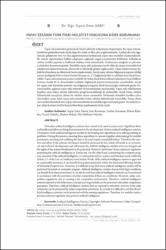Yapay zekanın Türk fikri mülkiyet hukukuna göre korunması
Citation
Sarı, O., (Ocak 2020). Yapay Zekanın Türk Fikri Mülkiyet Hukukuna Göre Korunması. İzmir Barosu Dergisi, yıl 85 (1), 53-116.Abstract
Yapay zekâ sistemleri günümüzde birçok sektörde kullanılmaya başlanmıştır. Bu yapay zekâ sistemlerinin geliştirilmesinde kayda değer bir emek ve fikri çaba sergilenmektedir. Yazılımcılar yeni algoritmalar geliştirerek veya var olan algoritmalardan faydalanarak yapay zekâ modelleri oluşturmaktadır. Bu süreçte algoritmaların birlikte çalışmasını sağlamak, uygun parametreleri belirlemek, kullanılacak verinin tasnifini yapmak ve kodlamak oldukça emek istemektedir. Yazılımcının emeğinin ve çabasının ise hukuken korunması gerekir. Böylelikle yapay zekâ çalışmaları teşvik edilecek, sistem üzerindeki hak sahiplerinin hakları korunacak, ekonomik ve teknolojik gelişim sağlanacaktır. Yapay zekâyı koruyan hukuki bir düzenleme ise ülkemizde henüz yapılmamıştır. Ancak yapay zekânın bilgisayar programı niteliği nazara alındığında Fikir ve Sanat Eserleri Kanunu m. 2/1 bağlamında ilim ve edebiyat eseri olarak korunabilir. Yapay zekâ sisteminin patent verilebilir bir buluş olarak kabul edilmesi halindeyse Sınai Mülkiyet Kanunu madde 82 ve devamındaki maddeler bağlamında patent korumasından yararlanabilir. Ancak her yapay zekâ sisteminin patentle veya bilgisayar programı olarak korunacağını söylemek güçtür. Kanuni koşulları sağlayan yapay zekâ sistemleri bu korumalardan yararlanabilir. Yapay zekâ sistemlerinin
koşulları varsa haksız rekabet hükümleri gereği korunabileceği de söylenebilir. Ancak haksız rekabet
hükümleriyle amaçlanan dürüst bir rekabet ortamı yaratmaktır. Dolayısıyla dürüstlük kurallına aykırı
davranışlara maruz kalan yapay zekâ sistemleri haksız rekabet hükümleriyle korunabilir. Sonuç olarak
mevcut düzenlemelerle tüm yapay zekâ sistemlerinin korunabileceğini söylemek güçtür. Bu nedenle yapay zekâyı koruyan özel bir kanuni düzenleme yapılmasında fayda vardır. Nowadays artificial intelligence systems have started to be used in many sector. Significant labor and intellectual effort are being demonstrated in the development ofthese artificial intelligence systems. Developers create artificial intelligence models by developing new algorithms or by utilizing existing algorithms. During this process, ensuring these algorithms to operate together, determining the suitable
parameters, assorting and codifying the data to be used require remarkable labour. Therefore, the exertion and effort of the software developers should be protected by law, which will result in an economical and technical development and will ensure the artificial intelligence studies to be encouraged and the rights of the system beneficiariesto be protected. However, there hasn’t been a statutory regulation protecting the artificial intelligence in Turkey yet. On the other hand, considering the computer program character of the artificial intelligence, it can be protected as a science and literature work within the Article 2/1 of the Lawon Intellectual and Artistic Works.If the artificial intelligence system is approved
as a patentable invention, it can benefit from patent protection within the 82nd and following Articles
of Industrial Property Law. However, it is difficult to say that every artificial intelligence system will be
protected by patent or computer program. Artificial intelligence systems that provide legal conditions
can benefitfromthese protections.It can also be said that artificial intelligence systems can be protected
in accordance with the provisions of unfair competition if there are conditions. However, unfair competition regulations aim at creating a fair competitive environment. Therefore, artificial intelligence systems exposed to the behaviours contradictory to good faith can be protectedwith unfair competition provisions. Therefore, artificial intelligence systems that are exposed to behaviors contrary to the rules of honesty can be protected by unfair competition provisions. As a result, it is difficult to say that all artificial intelligence systems can be protectedwith the existing regulations.Therefore, it is useful tomake a peculiarstatutory regulation that protects artificial intelligence.


















